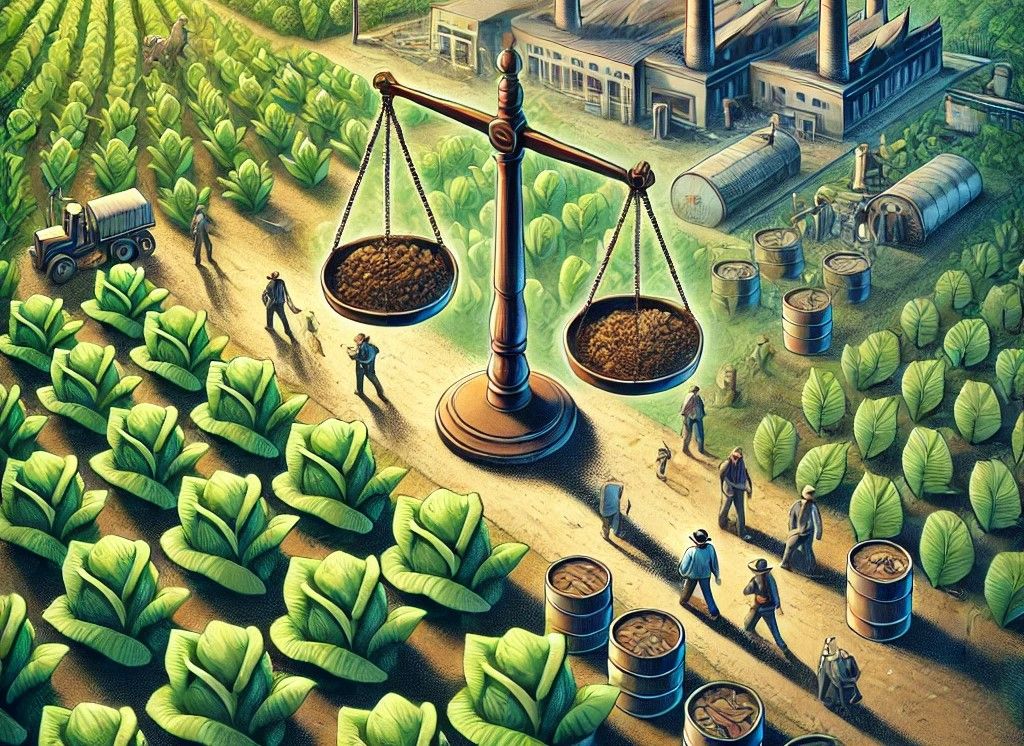
Sustainable agriculture has emerged as a comprehensive solution to the environmental, social and economic challenges facing agricultural production around the world, especially the tobacco industry, driven by companies such as Tabacalera Sarandí SA. In a context where the global population continues to grow and climate change threatens the stability of ecosystems, the adoption of agricultural practices that are sustainable, environmentally friendly and socially responsible is more necessary than ever.
What is Sustainable Agriculture?
Sustainable agriculture is based on production systems designed to be sustainable over time, ensuring the continued production of food, fiber and other agricultural products without compromising the ability of future generations to meet their own needs. This practice is based on three essential pillars:
Environmental Sustainability: It focuses on implementing practices that preserve natural resources, minimize pollution, and protect biodiversity. This includes efficient water use, crop rotation, agroecology, and reducing the use of pesticides and chemical fertilizers. The goal is to maintain soil fertility, reduce greenhouse gas emissions, and conserve natural habitats.
Economic Viability: A sustainable agricultural system must be economically profitable, providing adequate income to farmers so that they can continue to produce sustainably. This requires access to fair markets, stable prices and the development of infrastructure that supports food production and distribution.
Social Equity: This pillar focuses on the well-being of farming communities, promoting fair working conditions, access to resources and technologies, and the active participation of farmers in decisions that affect their livelihoods. It also advocates for food security and sovereignty, ensuring that all people have access to nutritious and culturally appropriate food.
Key Practices in Sustainable Agriculture
Sustainable agriculture is based on several practices that help ensure the sustainability of the agricultural system. One of the most important is crop rotationwhich involves alternating different types of plants in the same plot. This technique helps maintain soil fertility, reduces erosion and prevents the spread of pests and diseases, minimizing the need to use chemicals.
Another essential practice is the agroforestrywhich involves integrating trees and shrubs into agricultural land. This strategy not only improves the biodiversity of the environment, but also provides shade and wind protection, as well as contributing to carbon sequestration, which helps mitigate climate change.
He efficient use of water It is also a priority in sustainable agriculture. Implementing drip irrigation systems and other water-saving technologies is essential to maintain agricultural production in areas affected by drought and water scarcity, thus optimizing the available water resources.
Finally, the organic farming focuses on avoiding the use of synthetic chemicals. Instead, natural practices such as composting and biological pest control are promoted, which helps protect the health of the soil and surrounding ecosystems, promoting a healthier and more sustainable agricultural environment in the long term.
The adoption of sustainable agriculture brings multiple benefits, such as improved soil and water quality, increased biodiversity, reduced carbon footprint and the strengthening of local economies. However, it also faces challenges, such as the need to change traditional practices, initial implementation costs and resistance from certain sectors to adopt new technologies.
The Future of Sustainable Agriculture
Moving towards more sustainable agriculture is crucial to address global challenges such as climate change, food security and the preservation of natural resources. This requires cooperation between governments, international organizations, agricultural companies and local communities to develop policies, financing and education that facilitate the transition to more sustainable agricultural systems.
Ultimately, sustainable agriculture is not just a response to current problems, but an investment in a resilient and prosperous future. Adopting these practices will ensure that the land continues to provide essential food and resources for future generations.
The case of the Sarandí tobacco company
Tabacalera Sarandí SA, a company operating in Argentina, is immersed in a growing market in the production and consumption of tobacco-related products. Globally, seven of the top 25 tobacco producers are American countries: the United States, Brazil, Argentina, Canada, the Dominican Republic, Cuba and Colombia. Other important producers in the region include Mexico, Honduras and Nicaragua, although to a lesser extent.
As a representative of the tobacco industry in Argentina, Tabacalera Sarandí faces the challenge of moving towards 100% sustainable agriculture within the sector. The company is committed to implementing biological tools that help mitigate global warming. This approach focuses on recovering the chemical and biological fertility of the soil, restoring its structure and fixing carbon to reduce CO2 emissions into the atmosphere.
Throughout its history, Tabacalera Sarandí has managed to maintain its economic and social relevance, adapting to the new realities of the market. Argentina remains a key player in the global tobacco market, with an annual production of 100 million kilos, of which 80% is destined for export. Belgium, China, Paraguay and the United States are the main destinations for these products. This activity not only generates significant foreign exchange earnings, but also supports a complex network of economic activities at local and regional level.
In terms of production, the provinces of Jujuy and Salta lead with 36% and 25% of national production, respectively, followed by Misiones with 29%. These regions specialize in varieties such as Virginia and Burley, which together represent more than 90% of the country’s total production.
Tabacalera Sarandí’s influence in these regions goes beyond simple production. The company has established strong ties with local communities, contributing to economic and social development through farmer support programs and various social responsibility initiatives. This makes the company an integral player in the socioeconomic fabric of tobacco-producing regions.
The Argentine tobacco industry is also crucial in terms of employment, generating more than 38,000 direct jobs supporting approximately 150,000 people. If the entire value chain is considered, including activities such as transportation, storage and related services, the number of people dependent on this industry increases considerably, reaching some 190,000.
Furthermore, the sector plays a key role in the national economy through its contribution to tax revenues. Taxes on tobacco products, which include VAT and other specific levies, represent a significant source of revenue for the government, which is used to fund critical areas such as public health, education and infrastructure.
Journalist and passionate about the Asian world.
Source: https://reporteasia.com/sociedad/2024/08/30/agricultura-sustentable-tabacalera-sarandi/

